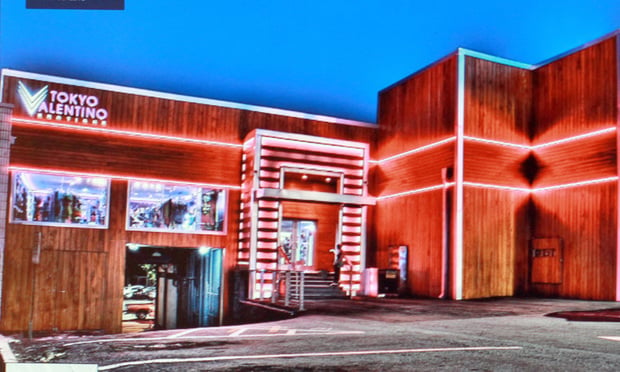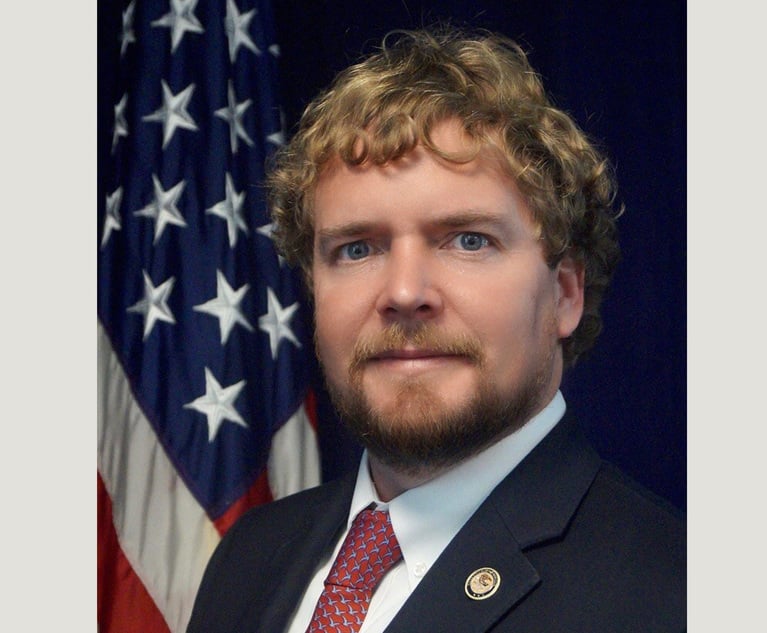Judge Rules Cheshire Bridge 'Adult Superstore' Violates City Code
Judge Thomas Thrash tossed out a constitutional challenge to the city's adult entertainment ordinance, and permanently enjoined Tokyo Valentino's Cheshire Bridge Road store from operating in its current location.
January 09, 2018 at 04:01 PM
6 minute read

A federal judge last week issued an injunction finding Cheshire Bridge Road “adult superstore” Tokyo Valentino in violation of Atlanta's adult entertainment ordinance and tossed the store's constitutional challenge to the city's statutes.
The injunction and order signed by Judge Thomas Thrash of the Northern District of Georgia said the store, one of four metro Tokyo Valentino outlets, has been in violation of a city ordinance since it opened in 1996 that prohibits adult businesses from being within 500 feet of a residential area.
But it was the store's own lawsuit against the city in 2015 that led to the city's counterclaims.
As Thrash noted in his summary judgment order, Tokyo Valentino was operating as an adult bookstore and “mini-cinema” featuring 20 private viewing booths for many years and was known to city officials, who nonetheless allowed it to remain in business.
As detailed in court filings, Atlanta revised its code in 1987 to place the 500-foot limit on “adult businesses,” which included adult bookstores, movie theaters, “mini-motion picture” theaters and entertainment establishments.
But there was, in Thrash's terms, a loophole: the city's definition of adult bookstores said nothing about selling sex toys or explicit videos.
Michael Morrison, the owner of Tokyo Valentino's corporate parent, contacted the city in 1996 about opening a store to sell “novelties, cards, CD-ROM, video, lingerie (not live) and condoms.” His letter said no adult books or video rooms would be included.
Morrison followed up with a permit application the same day City Council passed an amendment adding novelties and videos to the definitions list.
The city denied the permit, but a Fulton County Superior Court judge ruled the store should have been deemed a lawful nonconforming use under the prerevision code and ordered the permit granted. The Georgia Supreme Court declined to hear the city's appeal.
Shortly after opening what would in time become Tokyo Valentino, the store installed 20 video booths in its basement.
“The sexually erotic media displayed in these booths is, and has always been, non-obscene, constitutionally-protected erotic speech,” said the store's complaint. Since then, it said, the store was often visited by code and building inspectors, and the city knew about the video booths in the basement.
The store's corporate owner, Cheshire Visuals, filed a federal lawsuit in 1998 seeking to have the city pay for damages it suffered while its permit request was denied, although it did not challenge the constitutionality of either the old or revised ordinance. The court granted summary judgment to the city, and the U.S. Court of Appeals for the Eleventh Circuit upheld that ruling.
The situation remained unchanged until 2014, when the store applied to the city for a permit to renovate its facade and build out an unused section.
“The plan was to begin using an unoccupied portion of the building to operate a social club” that “would not offer adult entertainment or alcoholic beverage service,” the complaint said.
The permit application “sparked a neighborhood uproar,” it said. “Presumably based on political pressure, the city's inspectors then visited the property a number of times.”
The city determined the video booths in the basement were a code violation and issued a “cease and desist” order demanding they be removed. The city's Board of Zoning Adjustments denied the store's appeal.
Tokyo Valentino's corporate owner, now known as Cheshire Bridge Holdings LLC, sued the city and its zoning board in 2015, claiming Atlanta's adult entertainment ordinance violated its Fourth Amendment rights.
The city counterclaimed, saying the store had been in violation of its permit since it opened and that its long-standing unlawful operation forfeited any nonconforming use rights it might have had and asking the court for an injunction shutting it down.
Both sides moved for summary judgment.
Thrash disposed of the store's constitutional claims for several reasons, beginning with the earlier Cheshire Visuals litigation, which he said offered an opportunity to challenge the constitutionality of the adult entertainment code.
Because both that suit and the 2015 action involved the same parties and were adjudicated to conclusion, the 2015 claims are precluded, he wrote.
“More specifically, if the plaintiffs could have challenged the constitutionality of the same definitions of three types of adult businesses back then that they do now … then their challenges must fail,” Thrash said.
As to the store's argument that the regulations violated the store's free speech rights, they “do not ban outright any adult businesses but merely restrict where they may be located,” he wrote.
On Jan. 4 Thrash issued a permanent injunction barring the store from operating an adult mini-motion picture theater, adult bookstore or adult entertainment establishment.
Cary Wiggins of Wiggins Law Group, who represents the plaintiff, said he and his client are studying the order and considering whether an appeal or other avenue is the most appropriate response.
The city is represented by Senior Assistant City Attorney Jeffrey Haymore and outside counsel Scott Bergthold of Chattanooga. A city spokeswoman said via email that Thrash's order should lead to the store's closure, “because the zoning ordinance, since 1987, has prohibited an adult business at the site.
Asked whether Tokyo Valentino may have brought the injunction on itself by suing in 2015, the city responded that “no one knows what would have happened if Tokyo had not engaged in those activities and sued the City and the BZA.”
This content has been archived. It is available through our partners, LexisNexis® and Bloomberg Law.
To view this content, please continue to their sites.
Not a Lexis Subscriber?
Subscribe Now
Not a Bloomberg Law Subscriber?
Subscribe Now
NOT FOR REPRINT
© 2025 ALM Global, LLC, All Rights Reserved. Request academic re-use from www.copyright.com. All other uses, submit a request to [email protected]. For more information visit Asset & Logo Licensing.
You Might Like
View All
'Didn't Notice Patient Wasn't Breathing': $13.7M Verdict Against Anesthesiologists
12 minute read

Trending Stories
- 1'AI-Generated' Case References? This African Law Firm Is Under Investigation
- 2John Deere Annual Meeting Offers Peek Into DEI Strife That Looms for Companies Nationwide
- 3Why Associates in This Growing Legal Market Are Leaving Their Firms
- 4Visa's Defense of DOJ Antitrust Case Suffers Setback After Court Denies Motion to Dismiss
- 5Greenberg Traurig Combines Digital Infrastructure and Real Estate Groups, Anticipating Uptick in Demand
Who Got The Work
J. Brugh Lower of Gibbons has entered an appearance for industrial equipment supplier Devco Corporation in a pending trademark infringement lawsuit. The suit, accusing the defendant of selling knock-off Graco products, was filed Dec. 18 in New Jersey District Court by Rivkin Radler on behalf of Graco Inc. and Graco Minnesota. The case, assigned to U.S. District Judge Zahid N. Quraishi, is 3:24-cv-11294, Graco Inc. et al v. Devco Corporation.
Who Got The Work
Rebecca Maller-Stein and Kent A. Yalowitz of Arnold & Porter Kaye Scholer have entered their appearances for Hanaco Venture Capital and its executives, Lior Prosor and David Frankel, in a pending securities lawsuit. The action, filed on Dec. 24 in New York Southern District Court by Zell, Aron & Co. on behalf of Goldeneye Advisors, accuses the defendants of negligently and fraudulently managing the plaintiff's $1 million investment. The case, assigned to U.S. District Judge Vernon S. Broderick, is 1:24-cv-09918, Goldeneye Advisors, LLC v. Hanaco Venture Capital, Ltd. et al.
Who Got The Work
Attorneys from A&O Shearman has stepped in as defense counsel for Toronto-Dominion Bank and other defendants in a pending securities class action. The suit, filed Dec. 11 in New York Southern District Court by Bleichmar Fonti & Auld, accuses the defendants of concealing the bank's 'pervasive' deficiencies in regards to its compliance with the Bank Secrecy Act and the quality of its anti-money laundering controls. The case, assigned to U.S. District Judge Arun Subramanian, is 1:24-cv-09445, Gonzalez v. The Toronto-Dominion Bank et al.
Who Got The Work
Crown Castle International, a Pennsylvania company providing shared communications infrastructure, has turned to Luke D. Wolf of Gordon Rees Scully Mansukhani to fend off a pending breach-of-contract lawsuit. The court action, filed Nov. 25 in Michigan Eastern District Court by Hooper Hathaway PC on behalf of The Town Residences LLC, accuses Crown Castle of failing to transfer approximately $30,000 in utility payments from T-Mobile in breach of a roof-top lease and assignment agreement. The case, assigned to U.S. District Judge Susan K. Declercq, is 2:24-cv-13131, The Town Residences LLC v. T-Mobile US, Inc. et al.
Who Got The Work
Wilfred P. Coronato and Daniel M. Schwartz of McCarter & English have stepped in as defense counsel to Electrolux Home Products Inc. in a pending product liability lawsuit. The court action, filed Nov. 26 in New York Eastern District Court by Poulos Lopiccolo PC and Nagel Rice LLP on behalf of David Stern, alleges that the defendant's refrigerators’ drawers and shelving repeatedly break and fall apart within months after purchase. The case, assigned to U.S. District Judge Joan M. Azrack, is 2:24-cv-08204, Stern v. Electrolux Home Products, Inc.
Featured Firms
Law Offices of Gary Martin Hays & Associates, P.C.
(470) 294-1674
Law Offices of Mark E. Salomone
(857) 444-6468
Smith & Hassler
(713) 739-1250







